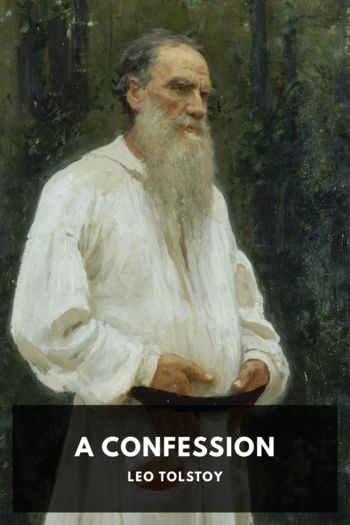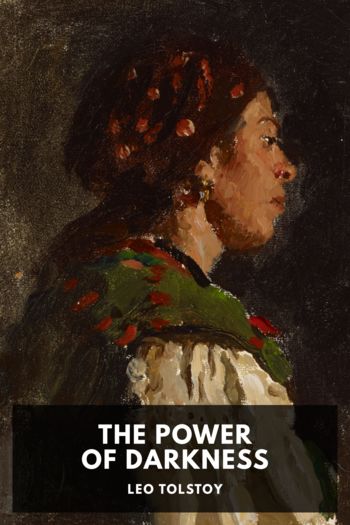Resurrection by Leo Tolstoy (best sci fi novels of all time TXT) 📕

- Author: Leo Tolstoy
Book online «Resurrection by Leo Tolstoy (best sci fi novels of all time TXT) 📕». Author Leo Tolstoy
Everything seemed festive, solemn, bright, and beautiful: the priest in his silver cloth vestments with gold crosses; the deacon, the clerk and chanter in their silver and gold surplices; the amateur choristers in their best clothes, with their well-oiled hair; the merry tunes of the holiday hymns that sounded like dance music; and the continual blessing of the people by the priests, who held candles decorated with flowers, and repeated the cry of “Christ is risen!” “Christ is risen!” All was beautiful; but, above all, Katúsha, in her white dress, blue sash, and the red bow on her black head, her eyes beaming with rapture.
Nekhlúdoff knew that she felt his presence without looking at him. He noticed this as he passed her, walking up to the altar. He had nothing to tell her, but he invented something to say and whispered as he passed her: “Aunt told me that she would break her fast after the late mass.” The young blood rushed up to Katúsha’s sweet face, as it always did when she looked at him. The black eyes, laughing and full of joy, gazed naively up and remained fixed on Nekhlúdoff.
“I know,” she said, with a smile.
At this moment the clerk was going out with a copper coffeepot12 of holy water in his hand, and, not noticing Katúsha, brushed her with his surplice. Evidently he brushed against Katúsha through wishing to pass Nekhlúdoff at a respectful distance, and Nekhlúdoff was surprised that he, the clerk, did not understand that everything here, yes, and in all the world, only existed for Katúsha, and that everything else might remain unheeded, only not she, because she was the centre of all. For her the gold glittered round the icons; for her all these candles in candelabra and candlesticks were alight; for her were sung these joyful hymns, “Behold the Passover of the Lord,” “Rejoice, O ye people!” All—all that was good in the world was for her. And it seemed to him that Katúsha was aware that it was all for her when he looked at her well-shaped figure, the tucked white dress, the wrapt, joyous expression of her face, by which he knew that just exactly the same that was singing in his own soul was also singing in hers.
In the interval between the early and the late mass Nekhlúdoff left the church. The people stood aside to let him pass, and bowed. Some knew him; others asked who he was.
He stopped on the steps. The beggars standing there came clamouring round him, and he gave them all the change he had in his purse and went down. It was dawning, but the sun had not yet risen. The people grouped round the graves in the churchyard. Katúsha had remained inside. Nekhlúdoff stood waiting for her.
The people continued coming out, clattering with their nailed boots on the stone steps and dispersing over the churchyard. A very old man with shaking head, his aunts’ cook, stopped Nekhlúdoff in order to give him the Easter kiss, his old wife took an egg, dyed yellow, out of her handkerchief and gave it to Nekhlúdoff, and a smiling young peasant in a new coat and green belt also came up.
“Christ is risen,” he said, with laughing eyes, and coming close to Nekhlúdoff he enveloped him in his peculiar but pleasant peasant smell, and, tickling him with his curly beard, kissed him three times straight on the mouth with his firm, fresh lips.
While the peasant was kissing Nekhlúdoff and giving him a dark brown egg, the lilac dress of Matróna Pávlovna and the dear black head with the red bow appeared.
Katúsha caught sight of him over the heads of those in front of her, and he saw how her face brightened up.
She had come out with Matróna Pávlovna on to the porch, and stopped there distributing alms to the beggars. A beggar with a red scab in place of a nose came up to Katúsha. She gave him something, drew nearer him, and, evincing no sign of disgust, but her eyes still shining with joy, kissed him three times. And while she was doing this her eyes met Nekhlúdoff’s with a look as if she were asking, “Is this that I am doing right?” “Yes, dear, yes, it is right; everything is right, everything is beautiful. I love!”
They came down the steps of the porch, and he came up to them.
He did not mean to give them the Easter kiss, but only to be nearer to her. Matróna Pávlovna bowed her head, and said with a smile, “Christ is risen!” and her tone implied, “Today we are all equal.” She wiped her mouth with her handkerchief rolled into a ball and stretched her lips towards him.
“He is, indeed,” answered Nekhlúdoff, kissing her. Then he looked at Katúsha; she blushed, and drew nearer. “Christ is risen, Dmítri Ivánovitch.”
“He is risen, indeed,” answered Nekhlúdoff, and they kissed twice, then paused as if considering whether a third kiss were necessary, and, having decided that it was, kissed a third time and smiled.
“You are going to the priests?” asked Nekhlúdoff.
“No, we shall sit out here a bit, Dmítri Ivánovitch,” said Katúsha with effort, as if she had accomplished some joyous task, and, her whole chest heaving with a deep sigh, she looked straight in his face with a look of devotion, virgin purity, and love, in her very slightly squinting eyes.
In the love between a man and a woman there always comes a moment when this love has reached its zenith—a moment when it is unconscious, unreasoning, and with nothing sensual about it. Such a moment had come for Nekhlúdoff on that Easter eve. When he brought Katúsha back to his mind, now, this moment veiled all else; the smooth glossy black head, the white tucked





Comments (0)